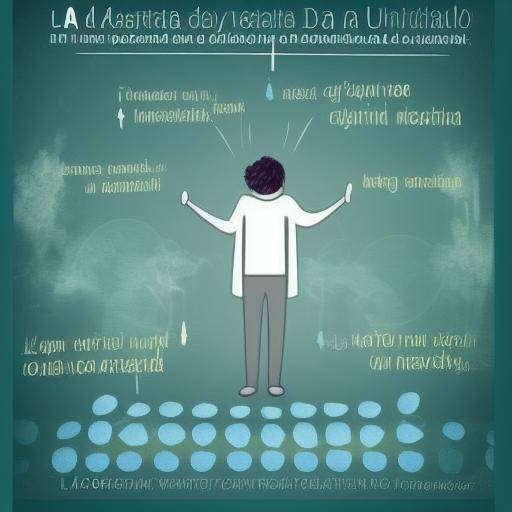
Self-affirmation is a powerful act of strengthening self-confidence and promoting emotional well-being. Throughout history, self-affirmation has played a key role in the configuration of self-confidence of individuals, directly impacting their quality of life and their ability to face challenges with greater strength. In this article, we will explore in depth the impact of self-affirmation on self-confidence and its relationship with emotional well-being. From its historical roots to its practical application in everyday life, we will unravel the benefits, challenges and future trends of these fundamental concepts for personal development.
Introduction
Self-affirmation is much more than simple words of encouragement; it is an active process through which people strengthen their identity, a task that impacts directly on self-confidence. Self-confidence, in turn, is the belief in one's own abilities and abilities to overcome challenges and achieve goals, being a fundamental pillar of emotional well-being. Throughout this article, we will explore how self-affirmation, self-confidence and emotional well-being are intrinsically related, and how they influence people's lives.
History and Background
Self-affirmation has its roots in various philosophical and psychological currents throughout history. From the concepts of self-affirmation in ancient Greek philosophy to its application in modern psychology, there has been a constant interest in understanding how people consolidate their self-confidence through self-affirmation. In the 1980s, researchers began to scientifically explore the effects of self-affirmation on self-confidence and emotional well-being, which contributed to the contemporary understanding of these concepts.
Over the years, different theories have been developed that explain how self-assertion can influence self-confidence and emotional well-being. These theories have laid the foundations for deeper research on the importance of self-affirmation in personal development, as well as its impact on emotional resilience in adverse situations.
Detailed Analysis
The process of self-affirmation and its influence on self-confidence not only have psychological impacts, but also extend to areas such as decision-making, stress management and conflict resolution. A study published in the Journal of Personality and Social Psychology found that people who practice self-assertion have higher levels of self-confidence, allowing them to face stressful situations with greater clarity and determination.
In addition, self-affirmation has proven to be beneficial to emotional well-being, as it strengthens people's ability to manage their emotions and maintain a positive attitude towards adversities.
Comprehensive review
The practice of self-affirmation can take various forms, from the pronouncement of positive statements to the holding of personal achievements. Self-confidence resulting from these acts of self-affirmation not only influences individual emotional well-being, but also impacts on interpersonal relationships, labour productivity and ability to face challenges with determination.
It is essential to understand that self-affirmation consists not only of empty phrases of positivity, but involves an active process of self-assessment and reaffirmation of personal values. This honest self-evaluation and the reinforcement of values are elementary for the cultivation of a solid and lasting self-confidence.
Comparative analysis
Compare self-affirmation, self-confidence and emotional well-being reveals the interconnection between these concepts and how they empower each other. While self-affirmation strengthens self-confidence, the latter directly influences people's emotional well-being, creating a continuous cycle of personal strengthening. Self-confidence, in particular, is at the centre of this cycle, as it acts as the engine that drives people to seek self-affirmation and, in turn, promotes greater emotional well-being.
Practical Tips and Recommendations
For those who seek to develop their self-confidence through self-affirmation, there are numerous practical strategies that can be implemented in everyday life. Some of these strategies include identifying and holding personal achievements, establishing realistic goals, developing a positive mentality and cultivating a constructive internal dialogue. By integrating these habits of self-affirmation into the daily routine, people can strengthen their self-confidence and improve their emotional well-being.
Perceptions of Industry and Expert Reviews
Experts in psychology and personal development agree that self-affirmation is an essential component to promote self-confidence and emotional well-being. In addition, they emphasize the importance of addressing self-affirmation in an authentic and based manner on genuine values, rather than resorting to empty or unlinked assertions of personal reality.
The self-help and emotional well-being industry has incorporated self-affirmation as a fundamental practice in numerous therapeutic approaches and personal development programmes. This integration reflects the growing understanding of the positive influence that self-affirmation can have on self-confidence and emotional well-being, backed by scientific evidence and life experiences.
Case Studies and Practical Applications
The application of self-affirmation in real contexts has shown significant results in promoting self-confidence and emotional well-being. Case studies in educational, labour and health environments have revealed how the implementation of self-affirmation strategies has helped improve the self-confidence of individuals, which in turn has resulted in greater emotional resilience and a more positive attitude towards life.
These practical cases illustrate how self-affirmation can be a powerful tool to promote self-confidence and emotional well-being in various areas of life, from academia to professional and staff.
Future Trends and Predictions
As awareness of the importance of self-affirmation in promoting self-confidence and emotional well-being continues to grow, new trends in related practices and approaches are expected to emerge. The integration of self-affirmation into therapeutic contexts and personal development programmes will continue to evolve, supported by innovative research and practical applications in various fields.
Technology is expected to play a crucial role in disseminating self-affirmation messages and in accessing resources that promote self-confidence and emotional well-being. Mobile applications, social media platforms and online resources will provide customized tools to boost self-assertion, allowing more people to cultivate their self-confidence and improve their emotional well-being.
Conclusion
In short, self-affirmation plays a key role in promoting self-confidence and emotional well-being. Through the strengthening of identity and the consolidation of personal values, self-assertion results in greater self-confidence that positively influences various aspects of life. By practising self-affirmation authentically and based on values, people can cultivate a solid self-confidence that allows them to address the challenges with determination and maintain balanced emotional well-being.
Frequently asked questions
What is self-affirmation?
Self-affirmation is a process by which people strengthen their identity and reaffirm their personal values, which contributes to the promotion of self-confidence and emotional well-being. This practice involves recognizing and celebrating the positive aspects of oneself, as well as establishing an internal narrative based on authenticity and positivity.
What is the importance of self-confidence?
Self-confidence is fundamental to personal development, as it influences the way people face challenges, make decisions and manage their emotions. A solid self-confidence promotes greater emotional well-being, allowing people to develop resilience and maintain a positive attitude towards life.
How can I practice self-affirmation in my daily life?
The practice of self-affirmation can take various forms, such as the pronunciation of positive affirmations, the recognition of personal achievements, the visualization of targets achieved and the cultivation of a positive mentality. Integrating these practices into the daily routine can strengthen self-confidence and promote emotional well-being.
Self-affirmation is only an exercise of self-help?
Self-affirmation goes beyond mere personal praise. It implies an active process of honest self-evaluation and the strengthening of personal values that entails the promotion of self-confidence and emotional well-being. It is important that self-affirmation is based on authenticity and genuine values.
What impact does self-affirmation have on decision-making?
Self-affirmation strengthens self-confidence, which in turn influences people's decision-making. Those who practice self-affirmation often address decisions with greater clarity and confidence, which can lead to more positive results in their personal and professional lives.
In what areas of life can self-affirmation have a significant impact?
Self-affirmation can positively impact various areas of life, including education, work, interpersonal relationships, stress management and emotional resilience. Strengthening self-confidence through self-affirmation can contribute to a more balanced and satisfactory life.
Conclusion
Self-affirmation plays a crucial role in promoting self-confidence and emotional well-being, positively impacting on the quality of life of people. By understanding the historical roots, practical benefits and future trends of self-affirmation, people can cultivate solid self-confidence and develop emotional resilience to face the challenges of life with determination and positivity.






















































